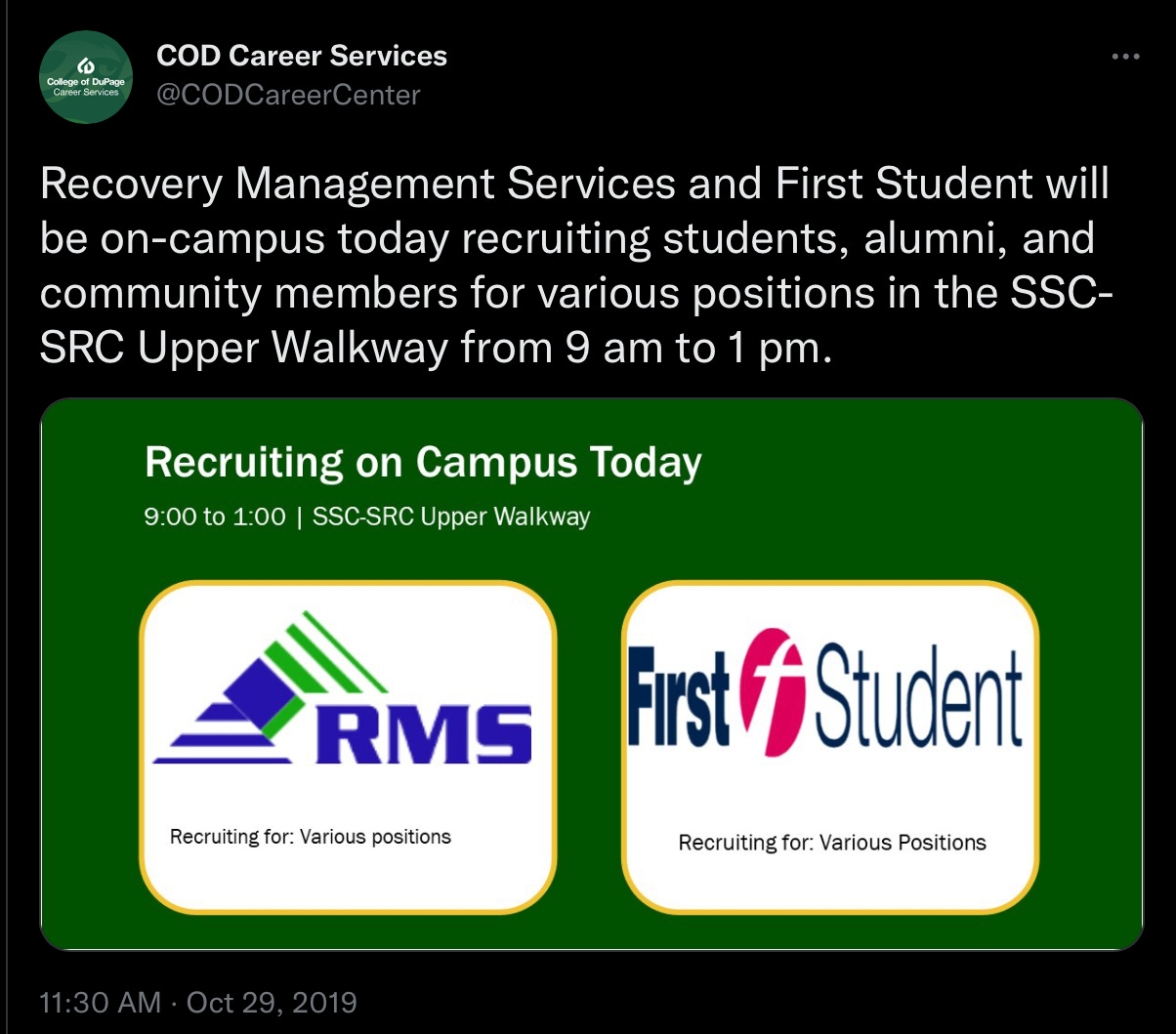If you’re a current or former student and you’ve been down the collections or recovery rabbit hole before, you may have come across Recovery Management Services (RMS). They are a debt collector that primarily collects from students or graduates that have delinquent student loans and the original loan servicer has given up on trying to collect from them/has sold the loan to RMS. They came to the attention of this blog because of a recent CFPB complaint against them. We thought that rather than just rely on the CFPB complaints, we would review their website, better business bureau presence, and any visibility on social media (in addition to the complaints, of course).
Starting off with the website - the home page is, quite frankly, terrifying. It boasts a picture of two graduates looking at each other, standing in an empty field, not exactly jubilant at the fact that they have just crossed a huge milestone. Then it flashes over to an image of a stoic looking graduate, staring off in the distance, determined but clearly not thrilled either. Don’t believe me? Here you go:
As someone who is in significant student loan debt myself, this immediately makes me thrilled they are not my servicer!
It gets better. Checking their “About Me” page, it is exclusively targeted towards the originators of student loans (higher education institutions) with the smallest bit of empathy for the folks they will be collecting from. They speak of “excellent customer service,” but the customer is these loan originators/universities and not the students/graduates they will be shaking down. For those folks, there is a small acknowledgment stating “Because we deal exclusively in higher education debt collection, we understand the effect our efforts have on a borrower’s perception of the school. We work to minimize negative perceptions with a sales-based, respectful approach to collections.” Having spent years listening to and auditing collections calls, I’m not sure that I would ever call them “sales-based” no matter how legal they are. However, “respectful” could be good! Hopefully…
They aren’t afraid to tout their focus on technology: “Technology is a priority. By constantly researching and improving the delivery of information, we are finding simpler and more effective ways to serve our clients. RMS offers a secure FTP site for account placement and report access. In addition, RMS offers borrowers the opportunity to create an account at www.rmsepay.com in order to pay online or change demographic information.” The only problem? Yeah, click the link.
The site doesn’t even work! A quick investigation to the best site ever, web.archive.org, reveals that actually there is a site where customers can pay, but it requires a redirect to a login for a different organization, ESCI, which is a front-end servicer that many higher ed institutions start off the servicing process with. It would seem based on this that at one time, RMS had its own payment system, then for a time they may have leveraged ESCI’s payment system, but now presumably they may have given up on the online payment approach altogether since the redirect isn’t happening anymore.
Coming to consumer complaints - this is the reason they are our focus today, along with the fact that they aren’t as well known as some of the other institutions that get cited frequently in these CFPB complaints. Some of the highlights from the CFPB’s database (we selected the ones that, even if they were responded to by RMS, are worth hearing just to understand the pain - whether real or not - that organizations cause customers - enough to get them to reach out to the CFPB and provide this much detail):
“This debt collector has obtained my private, personal information illegally. I have tried to fix this problem…but the collection agency stopped responding. I have had numerous individuals under this debt collection agency contact me outside the hours of [the FDCPA requires that debt collectors cannot call between 8AM and 9PM your local time], they have harassed me, they have berated me, threatened to take illegal action against me if I didn't answer the phone or if I didn't pay. My information was illegally sold to them by another agency. I am being harassed and my life, safety, and well being is being threatened. I have asked them to stop calling on multiple recorded lines and they keep calling and harassing me. I have multiple recorded phone calls of asking them to stop contacting me. My desired outcome is for this account to be void and deleted. This is not legal.”
These are all quite painful, but perhaps the most unfortunate behavior is on the better business bureau website. There are numerous complaints from consumers on there, and yes, just as with the above, there’s no way of determining the validity of these complaints, but the better business bureau does require the complained-about party to respond to complaints and highlight if they don’t. RMS responds, all right, but they do so with a standard response that essentially games the BBB’s system which highlights the company’s response rate (96%.- incredible! Or is it?)
“Hello,
I cannot go into detail as this response will be published for anyone to review if they go to the BBB website and I will not violate the consumer's privacy or federal law. If the consumer would like to discuss this matter, they can contact me directly at **************.
Regards,
**************************”
Over, and over, and over again - this is their standard response to every single complaint filed by consumers on the BBB site. This makes absolutely no sense - the consumer is the one filing the complaint, is filing anonymously, and furthermore, there is no federal law that prevents them from responding publicly - I’m no lawyer, but it seems that this “law” didn’t stop other collections agencies from responding to their customers. Because of this “response,” they avoid having a poor response rate from the BBB and actually look fantastic, when the reality is otherwise.
Finally, the most cynical note of all - a few years back, they came on-campus to College of DuPage (which is a good community college, I took a graphic design course for high schoolers there one summer when I was bored) to recruit students for jobs in their organization - in essence, using those who could not afford college against others who in their minds, could also not afford college judging from the fact that they were in deep debt (bearing in mind, people go into deep debt for more reasons than simply “I don’t want to pay it back.”)
Nothing inherently wrong with this, but of all the places they could recruit from, they have to go to college recruiting sessions to get future employees, currently college students, that will then be used to push other college students to pay them. I’m sure RMS would claim that this is to ensure students are spoken with by those who “have been there” and “who understand” and can maybe “get through” to the person so that they pay up.
The bottom line, the situation with the company is quite a mess. At a minimum, they should be called out for what comes across as cynicism. At a maximum, they should be required to undergo some sort of an external review, the results of which should be shared with their constituents (not who they think (loan originators/universities) but the actual constituents (students in debt)).
Hope you enjoyed this investigation and join us next time as we dig into more fintech horror stories. Take care.







